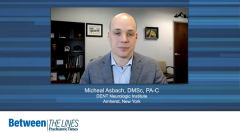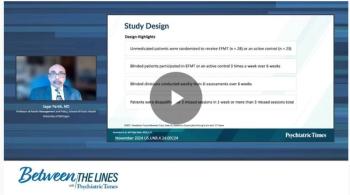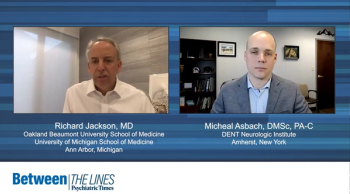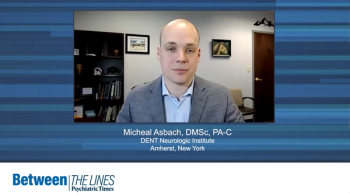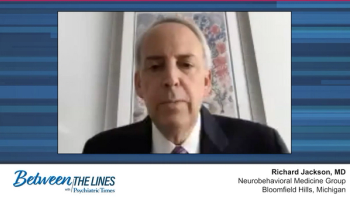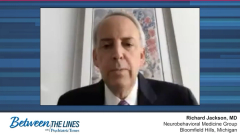
TD Impact on Clinical and Psychological Function
Richard Jackson, MD, and Micheal Asbach, DMSc, PA-C, discuss the physical, psychological, and social impacts of of tardive dyskinesia (TD) and how it may affect a patient’s underlying conditions.
Brought to you by Teva Medical Affairs.
Micheal Asbach, DMSc, PA-C: Now, I'd like to review the impact TD may have on clinical and psychological function. Richard, can you please describe the patient survey study findings on the impact of TD in the physical functioning of these patients?
Richard Jackson, MD: Absolutely. So, clearly, the impact of the movements can affect patients very differently, and that's why it's nice to look at patients' report, because what may impact one patient may be very different on another patient. And that's why the APA guidelines, it speaks now of treating TD not only in moderate and severe movements, but any movements where there's impact to the patient. And the survey really supports that because over 9 in 10 of the patients reported that TD impacted their physical functioning, and over two-thirds of them reported moderate to severe impact on their ability to fall asleep, sleep through the night, ability to exercise, do household chores, holding things, and then there was a significant amount of problems with eating. So, one of the most difficult things is having to eat slowly because of fear of choking, and often once you've choked, you fear of choking again. It's something like falling. Once you've fallen, especially if you're older, there's a great risk that you're gonna fall again. People talk about that. The same thing with choking and eating. So, what happens when you're worried about how you're eating and how you're chewing and how you're sleeping? It overflows into the social impact of TD. So, all of these domains really impact each other. So, it's very uncommon that you would have only impact in one domain without affecting the other domains. So, now you start feeling self-conscious, and you start avoiding, and you start feeling embarrassed, which can contribute to depression and the other difficulties. And something I think may be under-recognized is how much pain patients feel. So, the patient's reporting that they cause pain and frustration in their day-to-day lives. So, the study is really helpful for us to understand the impact that patients are going through because many of us, or many of the clinicians, haven't been routinely asking about the impact of TD movements.
Micheal Asbach, DMSc, PA-C: Yeah, it really does paint a broader picture, or maybe a more complete picture, of what these patients experience when they have TD and the level of suffering or difficulty that they have as a result of their symptoms. Now, tardive dyskinesia can also negatively affect management of underlying conditions, and to some degree you've highlighted this already, but what did the study reveal about this topic?
Richard Jackson, MD: Well, what we know is that any disorder that you're treating where there's tardive dyskinesia, the disorder is more difficult to treat. So, if you're treating psychosis, bipolar disorder, depression, all of those disorders are more difficult to treat if there's underlying TD, and it makes good sense. If you're depressed and now, you're socially isolative and embarrassed and anxious, it's going to contribute to your depression. Now, in the survey, what was found is that over one-third of the patients actually reported skipping or reducing or stopping their anti-psychotic medication. About 35% of the patients reported stopping visiting the doctor to treat underlying conditions. And I've had my own experiences when patients now see an abnormal movement or an adverse event, they no longer want to take that medication, but they also blame you as the clinician. They may become angry and not wanna see you. Nonadherence to an anti-psychotic medication is going be a significant risk factor in almost any disorder we treat, of course, to exacerbate the underlying condition and lead to relapse and potentially increase in hospitalization. So, it makes it very difficult to treat patients with tardive dyskinesia that's unrecognized or certainly not treated. What's been your experiences?
Micheal Asbach, DMSc, PA-C: Unfortunately, yes. Unfortunately, very similar. I think non-adherence in psychiatry is our number one enemy. And in these types of patients, especially patients that may have severe mental illness, we already struggle to have them buy into treatment and consistently adhere to treatment. And I think that's so true, that if you have something such as an abnormal movement develop, that may be the thing that pushes them over where they no longer take the medication, or maybe are inconsistent with the medication. Aside from just anti-psychotics, I've had experiences in a similar fashion where we've had patients lose trust in the medical system because they see this as something that the clinician caused, and this led to inconsistent appointment compliance or even losing the patient to follow up as a result. So, it can be a very difficult thing, not just with anti-psychotic compliance, but more broadly with patients' continued engagement in treatment.
Richard Jackson, MD: Now, we've touched on these domains and how they overlap with each other, but can you tell us a little bit more about the psychological and social impacts of TD in patients and what did the studies reveal about that?
Micheal Asbach, DMSc, PA-C: Absolutely. So, within the study, over three quarters of respondents affirmed that they felt sad or unhappy, irritable, frustrated or angry, tired, anxious or worried, unable to focus, unmotivated, embarrassed, shy or withdrawn, experienced low self-esteem, or were afraid of being rejected. Three quarters of patients reported that the TD symptoms impacted their ability to enjoy things that they used to do for fun, enjoy social activities or join social activities, join social activities due to difficulty speaking, socialize with friends, appear on video, or socialize with family.
Over 65% of patients reported being affected negatively by reactions from others.
Richard Jackson, MD: So now we can really see how this impact of TD plays a role in almost every aspect of patients' lives, but also in their professional lives. What are some of the key findings in this respect?
Micheal Asbach, DMSc, PA-C: Understandably, to me, when I read this study, it's not a huge shock, but 68% of patients reported impairment while working and 29% reported missing time at work. Patients with tardive dyskinesia and schizophrenia reported the greatest impact on work, with over 80% indicating that there was a negative effect, and this was followed by patients with tardive dyskinesia with bipolar disorder at about 74%. At least one quarter of patients reported a substantial impact of TD when applying for or attaining a job, seeking a promotion, or new responsibilities at their job. And sadly, I think about this even within my own clinic. If I had a patient that showed up to our office and wanted to apply for a job and had significant TD, I'm almost certain that they would be less likely to be hired. I say that as a clinician who is very aware of TD, but unfortunately, it is something that even when I look at it from our perspective, I can see how big of an impact these movements may have on people's ability to find work. Tardive dyskinesia also interferes with patients' punctuality at work and with pursuit of education, according to patients themselves. And again, this makes sense if they're having difficulty buttoning their shirts or if they're having difficulty eating. Earlier, you mentioned maybe they have to eat slower to avoid choking. This can really significantly impact their ability to be punctual and show up for work or school or other events in a timely fashion. The impact of TD on overall work impairment was greater than impairments reported for other conditions, including conditions such as lung cancer.
Richard Jackson, MD: Wow, so this impact is really dramatic on patients' lives. And we looked at the impressions that patients could share through the survey.
Newsletter
Receive trusted psychiatric news, expert analysis, and clinical insights — subscribe today to support your practice and your patients.


